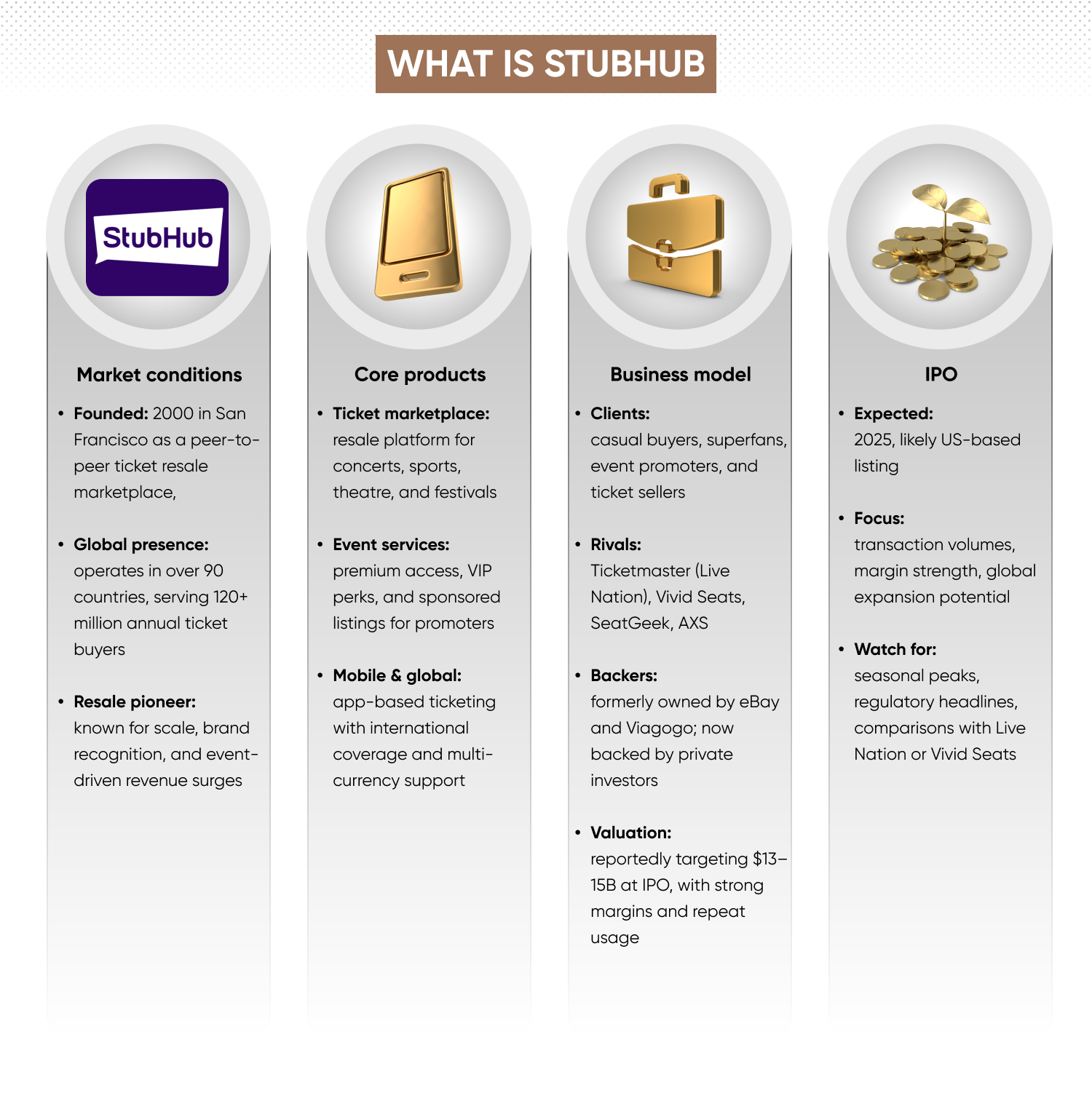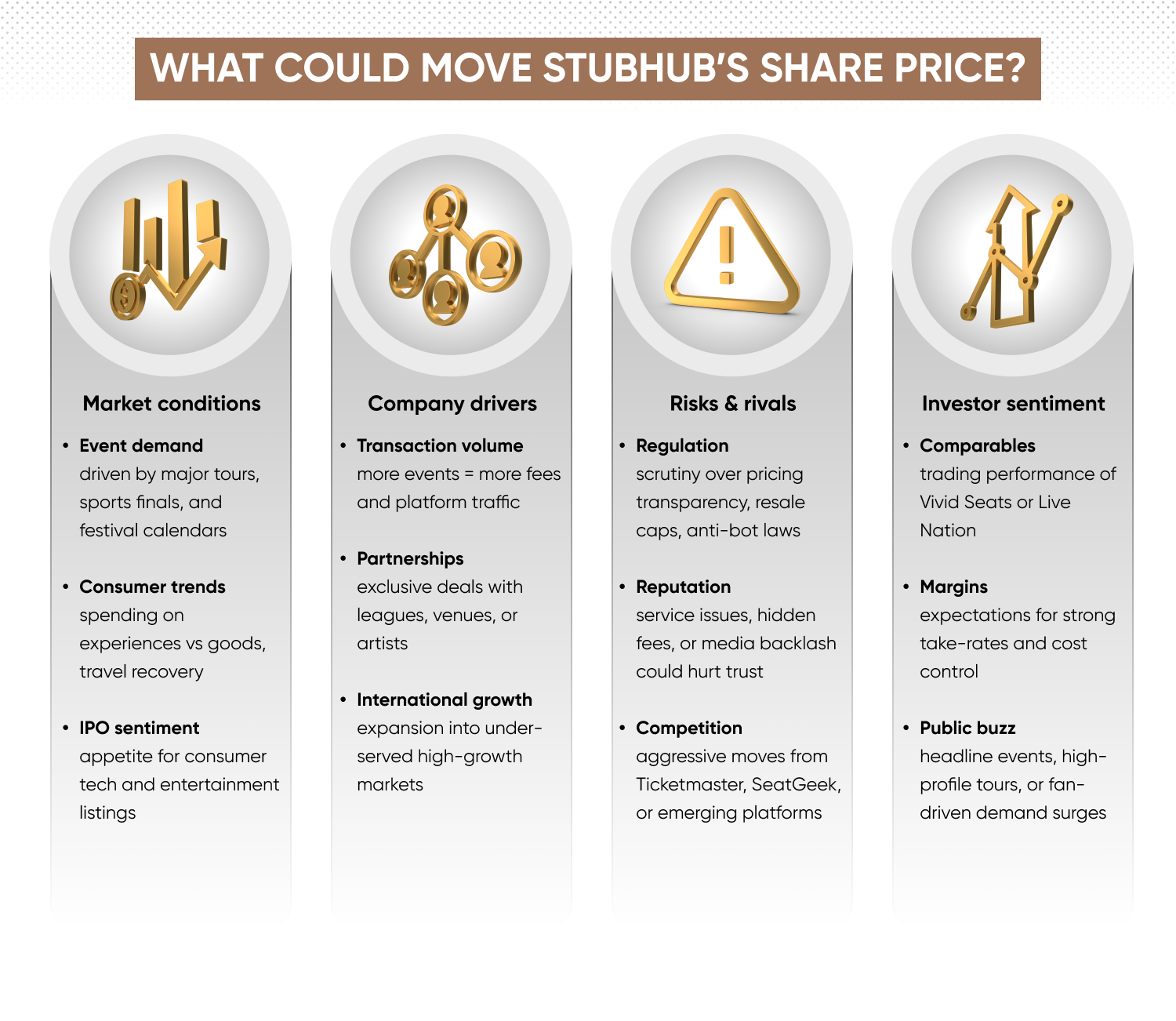StubHub IPO – how to trade StubHub shares

Create an account Open a demo account
When was the StubHub IPO date?
StubHub completed its initial public offering (IPO) on 16 September 2025, pricing shares at $23.50 and raising $800 million. The company began trading on the New York Stock Exchange under the ticker ‘STUB’ on 17 September 2025, achieving a market valuation of $8.6 billion. The move follows years of restructuring, including its separation from Viagogo to meet antitrust concerns. With the global rebound in live events and consumer appetite for experiences remaining strong, the company successfully capitalised on market momentum with its public debut (Reuters, 17 September 2025).
The IPO was influenced by several factors:
- Event demand cycles: a spike in blockbuster tours and major global sports tournaments contributed to revenue and valuation appeal.
- Regulatory readiness: StubHub overcame previous scrutiny over resale practices to successfully list.
- Market conditions: the IPO was timed to coincide with a favourable window for consumer tech and entertainment stocks.
Find out more about stock IPOs and listings with our guide to upcoming IPOs.
What is StubHub?
StubHub is an online marketplace that allows users to buy and sell tickets for live events – including concerts, sporting events, theatre shows, and festivals. Originally launched in 2000 and later acquired by eBay, StubHub was sold to Viagogo in 2020 and has since become an independent entity again following antitrust rulings. It’s one of the most recognisable brands in the ticket resale industry, operating globally across the US, UK, Europe, and beyond.
As of early 2025, StubHub reportedly serves over 120 million ticket buyers annually across more than 90 countries. The platform lists tens of millions of tickets each year, with revenues for 2024 at around $1.77bn. StubHub had an $8.6 billion valuation at IPO, below its earlier target of $13bn-$15bn but reflecting market conditions and recent performance trends.

Key milestones
- 2000 – StubHub founded as a peer-to-peer ticket resale platform
- 2007 – acquired by eBay for a reported $310m
- 2020 – eBay sells StubHub to Viagogo for $4.05bn
- 2021 – regulatory intervention forces separation of StubHub’s North American business
- 2024 – operates independently with $1.77bn revenue
- 2025 – completes IPO in September, raising $800m at $8.6bn valuation
How does StubHub make money?
StubHub makes money through a range of transaction-based and value-added services. Here’s a list of the company’s revenue streams.
| Revenue stream | Description |
|---|---|
| Ticket commissions | Fees charged to buyers and sellers on each ticket sale |
| Advertising and sponsorships | Revenue from promoted events and marketing partnerships with organisers |
| Payment and delivery fees | Charges for processing payments, transferring tickets, and fulfilment logistics |
| Premium services | Subscriptions and concierge access for frequent or VIP users |
| Global ticketing operations | Sales and fees from international resale markets |
StubHub’s model is volume-driven, meaning revenue tends to surge during peak event seasons or high-profile tours. The platform also benefits from pricing dynamics, where resale value can exceed face value for in-demand events.
What might influence the StubHub live stock price?
Following its September 2025 IPO, StubHub's share price will likely move in response to a mix of business performance, consumer behaviour, and external market forces. From major tour announcements and sports finals to pricing regulation and tech disruption, these are the factors that might push the StubHub share price higher – or lower following its public debut.
Demand for live events
If the trend of prioritising experiences over material goods continues, StubHub could benefit from a global upswing in demand for concerts, sports, and festivals. Big-name tours (like Taylor Swift or Coldplay), major tournaments (like the World Cup or Super Bowl), or even a strong theatre season could fuel transaction volumes and lift investor expectations.
Conversely, if consumer spending weakens due to economic pressure, or if event attendance levels off post-pandemic, ticket sales – and by extension, StubHub’s revenue – could soften, hurting the stock.
Partnerships and exclusive access
StubHub could see its stock rise if it secures exclusive ticketing rights with top-tier sports leagues, concert venues, or global event organisers. These deals would give the platform a competitive edge and ensure consistent user traffic. Investors may also reward StubHub for launching premium offerings or loyalty programmes that deepen customer relationships.
However, if rivals like Ticketmaster, SeatGeek, or new players secure these contracts instead, or if StubHub loses key partners, the market could view this as a setback.
Regulation and pricing scrutiny
StubHub operates in a space that’s increasingly under regulatory scrutiny. A clean bill of health from consumer watchdogs could boost investor confidence and reinforce the company’s image as a transparent, trusted marketplace.
However, proposed laws to cap resale markups, force upfront pricing, or limit bot-based ticket buying could eat into margins. Negative headlines about price gouging or service issues, especially during high-demand events, may also spark reputational damage that pressures the share price.
Expansion into global markets
StubHub's growth strategy could get a valuation lift if the company shows traction in new and fast-growing regions such as Latin America or Southeast Asia, where demand for live events is rising. A successful push into under-penetrated markets, coupled with localisation strategies, could broaden its revenue base and drive future growth.
But global expansion isn’t risk-free. Regulatory complexity, local competition, or poor customer uptake could lead to underperformance in new regions, weighing on earnings potential.
Technology and platform innovation
If StubHub invests in new technologies like AI-powered ticket recommendations, dynamic pricing engines, or blockchain for ticket authenticity, it could be seen as a forward-thinking platform that’s well-positioned for future growth. A seamless, mobile-first user experience may also drive higher engagement and repeat purchases.
However, if innovation lags or if the platform faces recurring issues with fraud, glitches, or customer service, the stock could face downside pressure from analysts and users alike.
Broader market conditions
StubHub's share price performance will also be influenced by external market dynamics. Strong sentiment in tech or entertainment stocks, healthy retail investor appetite, and the company's ability to demonstrate improving profitability could create momentum for the share price.
On the flip side, volatility in equity markets, interest rate fears, or concerns about the company's revenue growth or widening losses may pressure demand and lead to share price volatility.

How to trade StubHub stocks via CFDs
Since StubHub listed publicly in September 2025, you can trade STUB share CFDs. Here's how:
- Step 1: Choose a platform Capital.com offers CFD trading on thousands of global stocks, including new IPOs and event-driven firms.
- Step 2: Open an account Register, verify your identity, and choose your trading preferences.
- Step 3: Fund your account Deposit funds into your account. Only trade with capital you can afford to risk.
- Step 4: Track the stock price Follow StubHub stock price movements, news, and charts as the stock continues trading.
- Step 5: Trade the share via CFDs Use long or short positions to speculate on StubHub share price movements. Add stop-losses and take-profits to manage risk.
Learn more in our CFD trading guide.
Which entertainment and ticketing stocks can I trade?
StubHub is now publicly listed alongside several other companies offering exposure to live events, ticketing platforms, and entertainment tech:
- StubHub (STUB) – recently listed, secondary ticketing marketplace
- Live Nation (LYV) – owns Ticketmaster and promotes global tours and festivals
- Eventbrite (EB) – provides ticketing solutions for mid-size and grassroots events
- AMC Entertainment (AMC) – cinema chain with exposure to live events and movie premieres
- Spotify (SPOT) – partners with artists and promoters to drive concert attendance
See our full shares trading guide to explore more opportunities.
FAQ
Who owns StubHub?
StubHub is now a publicly traded company following its September 2025 IPO. Prior to going public, it was privately owned following its separation from Viagogo, which was required by regulators in both the US and UK. The company was backed by a mix of institutional investors, private equity firms, including Madrone Capital Partners (which owns 22.1% after the IPO), and a leadership team led by CEO Eric Baker, who maintains controlling voting power.
How much is StubHub worth?
StubHub completed its IPO in September 2025 with a valuation of $8.6 billion, raising $800 million by pricing shares at $23.50 each. This final valuation was below the company's earlier target of $16.5 billion, reflecting market conditions and the company's recent financial performance, including slowing revenue growth.
When did StubHub IPO?
StubHub completed its IPO on 16 September 2025. The company began trading on the New York Stock Exchange under the ticker symbol ‘STUB’ on 17 September 2025.
Can I invest in StubHub before the IPO?
Since StubHub has already completed its IPO, shares are now available for purchase through standard stock trading platforms. The company's shares trade on the New York Stock Exchange under the ticker 'STUB'.
Will StubHub be available for CFD trading?
Following its public listing, StubHub CFDs are available to trade through brokers like Capital.com. This allows you to trade on the company's stock price without owning the underlying asset, using leverage and risk management tools such as stop-losses and take-profits. CFDs are traded on margin, which means leverage higher than 1:1 amplifies both your potential losses and potential gains.
Discover more upcoming IPOs
Stay informed on upcoming IPOs, market trends, and the newest trading opportunities

eToro IPO
